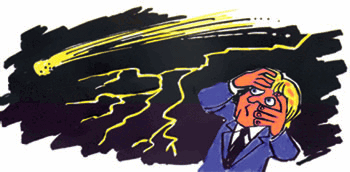phobo-, phob-, -phobia, -phobias, -phobe, -phobiac, -phobist, -phobic, -phobism, -phobous
(Greek: fear, extreme fear of; morbid, excessive, irrational fear, or terror of something or someone; however, sometimes this Greek element also means a strong dislike, dread, or hatred for something or someone)
For more details about the various phobias, visit this Phobias Introduction page to see Phobia Variations Defined and Explained.
There are only two forces that unite men: fear and self-interest.
A horrific fear of the earsplitting, explosive clamor and bolts of bright lights from the sky: Astrapophobia presents an air of terrifying finality, like the clap of doom, and some people tremble at the thought of being struck by lightning, and therefore they have a horror of thunderstorms.


An excessive fear of stars and how they may have adverse influences on one's life or destiny: Since she was a child, Susan suffered from astrophobia and refused to go out when the night was dark and cloudless believing that she would be predestined to doom.
astrophobic (adjective), more astrophobic, most astrophobic
A reference to an excessive or morbid dread of stars and how they may have negative influences on one’s life or future destiny: Tim thought a lot about his job after completing his university education and decided to avoid going out at night because of his astrophobic anxieties which might affect his career in an adverse and destructive way.
1. An excessive fear of clutter, disarray, disarrangement, or of being in an disheveled situation: Some people who are afflicted with ataxiophobia have obsessive-compulsive ailments that are persistent, intense, senseless, and worrisome, in fact they tend to be so excessive at keeping things neat and tidy that they make it nearly impossible to exist with others who are of a less-than-orderly nature.
2. An abnormal fear of falling or tripping: Ataxia is a lack of co-ordination in the muscles which is a symptom of damage to part of the central nervous system, and so people who have ataxiophobia may be that way because of their experiences in swaying or even falling down, especially if they close their eyes even for a second.
2. An abnormal fear of falling or tripping: Ataxia is a lack of co-ordination in the muscles which is a symptom of damage to part of the central nervous system, and so people who have ataxiophobia may be that way because of their experiences in swaying or even falling down, especially if they close their eyes even for a second.
A mental dread of disorder or chaos: Every time Mrs. Smith went to visit her husband's Aunt Gracia, Gracia's ataxophobia appeared to increase because she was constantly rearranging things on her shelves or dusting things to such a degree, that it was impossible to carry on much of a conversation with her.
An excessive dread of one's imperfection or incompleteness: Ted is someone who is unduly concerned with what others think about him and his atelophobia provides an incentive for him to strive to do better, or at least to keep anyone else from noticing his failures.
1. A dreadful fear of catastrophes: After reading the newspaper about the terrible airplane crash, Jane, who was quite affected with atephobia, decided not to read the newspaper or watch the news on TV anymore.
2. An excessive apprehension of ruins, either historical or those after a recent disaster, as with fire or flooding: Jack lost his father in the earthquake the previous year, and since then he could not bear to live in such an earthquake-prone area with all the destruction they caused, and became quite afflicted with atephobia.
2. An excessive apprehension of ruins, either historical or those after a recent disaster, as with fire or flooding: Jack lost his father in the earthquake the previous year, and since then he could not bear to live in such an earthquake-prone area with all the destruction they caused, and became quite afflicted with atephobia.
A loathing of atheism or atheists: The hostility against those who do not believe in God includes persecution, discrimination, intolerance, and prejudice, and is common among those who are quite influenced by atheophobia.
An excessive fear of failure: The supervisor's evaluation suggested to Thomas that he seek counseling for his atychiphobia because it seemed that he had no confidence in himself and feared ridicule, and this appeared to be interfering with his work.
An excessive fear of seeing, handling, or playing a flute: Greg could never understand why his sister suffered from aulophobia, not being able to stand the sound of any woodwind instrument!
A strong dislike of gold because of what it represents: Aurophobia may relate to a discomfort with financial success and having so much money.
A fear or anxiety about the northern or auroral lights: Auroraphobias may result because of the radiant emission that comes from the upper atmosphere in the form of luminous bands, streamers, etc.
A fear of, or the delusion, that a person has a vile or repugnant body odor: Anyone who suffers from autodysomophobia often has an ablutomania, or a habit of bathing very often, and avoids any normal social contacts.
Mr. Stevens was seeing a psychiatrist on a regular basis in hopes of overcoming his autodysomophobia so he could be more comfortable in being around people and not constantly being afraid of smelling bad.
An abnormal fear of ventriloquists' dummies, wax statues, or anything that represents a non-living being that appears to have feelings or perceptions: Tom couldn't stand animatronic creatures after being at the circus with his family, and he developed automatonophobia after having nightmares about such humanlike figures chasing and attacking him!
An excessive fear of being dirty and stinking, or of personal filth which may result in abnormally frequent bathing, as shown in the illustration below: Ted thought that he needed to take a long bath or shower each morning, every time he came home from school, and in the evening, thinking that he smelled quite offensive to himself and to others, and, as a result, he developed automysophobia.




